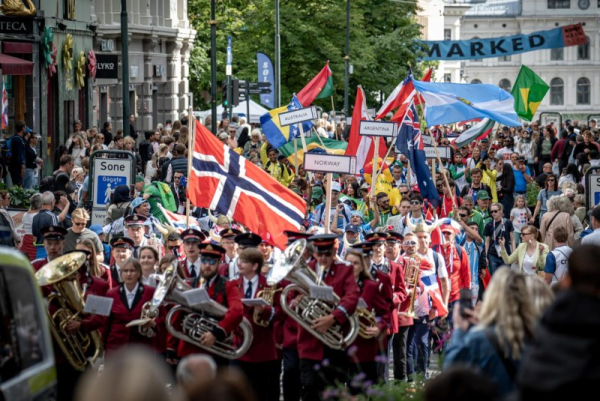Participating players have experienced either homelessness or social exclusion.


More than 500 soccer players, who have experienced homelessness in 48 countries, converged this week on Oslo, Norway, where the 20th annual Homeless World Cup is being played. Photo by Homeless World Cup
The 20th annual Homeless World Cup, a soccer tournament to create community and end homelessness, kicked off this week in Norway.
More than 500 players from 48 countries gathered for the tournament, which runs through Saturday in Oslo. Besides sport, the Homeless World Cup’s goal is to give participating players a sense of purpose and belonging.
“What’s unfolding in Oslo over the next week is much more than a game,” said Mel Young, who co-founded the tournament in 2003. “It’s like the firefly effect. One light alone is just a spark, but many together will create a bright light. This is what the Homeless World Cup can do.”
The tournament, which is organized by The Salvation Army Norway, is taking place at Oslo’s City Hall Square, Radhusplassen and is free to the public. At nearby Nobel Peace Center, The Cities Ending Homelessness Forum is exploring solutions, while discussing women’s homelessness and gender-based violence, drug and alcohol addiction, loneliness and social work.
“This morning, the Cities Ending Homeless Forum began in the Nobel Peace Center’s Nelson Mandela Room. His quote over the entrance to the room: ‘The best weapon is to sit down and talk.’ Sport. Solidarity. Change,” Homeless World Cup wrote Monday in a post on X.
This morning, the Cities Ending Homeless Forum began in the Nobel Peace Centre's Nelson Mandela Room. His quote over the entrance to the room:
"The best weapon is to sit down and talk." ⚽️ Sport. Solidarity. Change. https://t.co/AXfVggfHfs pic.twitter.com/9H89lQpHzn— Homeless World Cup (@homelesswrldcup) August 25, 2025
The Homeless World Cup, which was created by Young and Harald Schmied, has affected the lives of 1.3 million people and supports more than 200,000 participants each year, according to the organization, which says 94% of players have reported a positive effect on their lives. Another 83% reported improved relationships with family and friends, and 76% said they continued playing football/soccer after the event.
Participating players have experienced either homelessness or social exclusion, and have represented their countries by playing for a local street football program. The event connects more than 70 street football organizations around the world. At the tournament, the games are played four-a-side, squad of eight rolling subs 14 minutes.
Tournament matches will take place each day this week on three pitches, which will lead up to the finals on Saturday. Mexico is looking to retain its titles in both the men’s and women’s competitions this year. The matches are being streamed globally and can be viewed live on FIFA+, Homeless World Cup YouTube and Eurovision Sport.
As of play on Monday, Austria’s women beat Switzerland 3-0 and Egypt outlasted Tanzania 7-3. Bosnia & Herzegovina’s men beat Kyrgyz Republic 7-2, while Austria’s men finished over Ivory Coast by a score of 7-1.